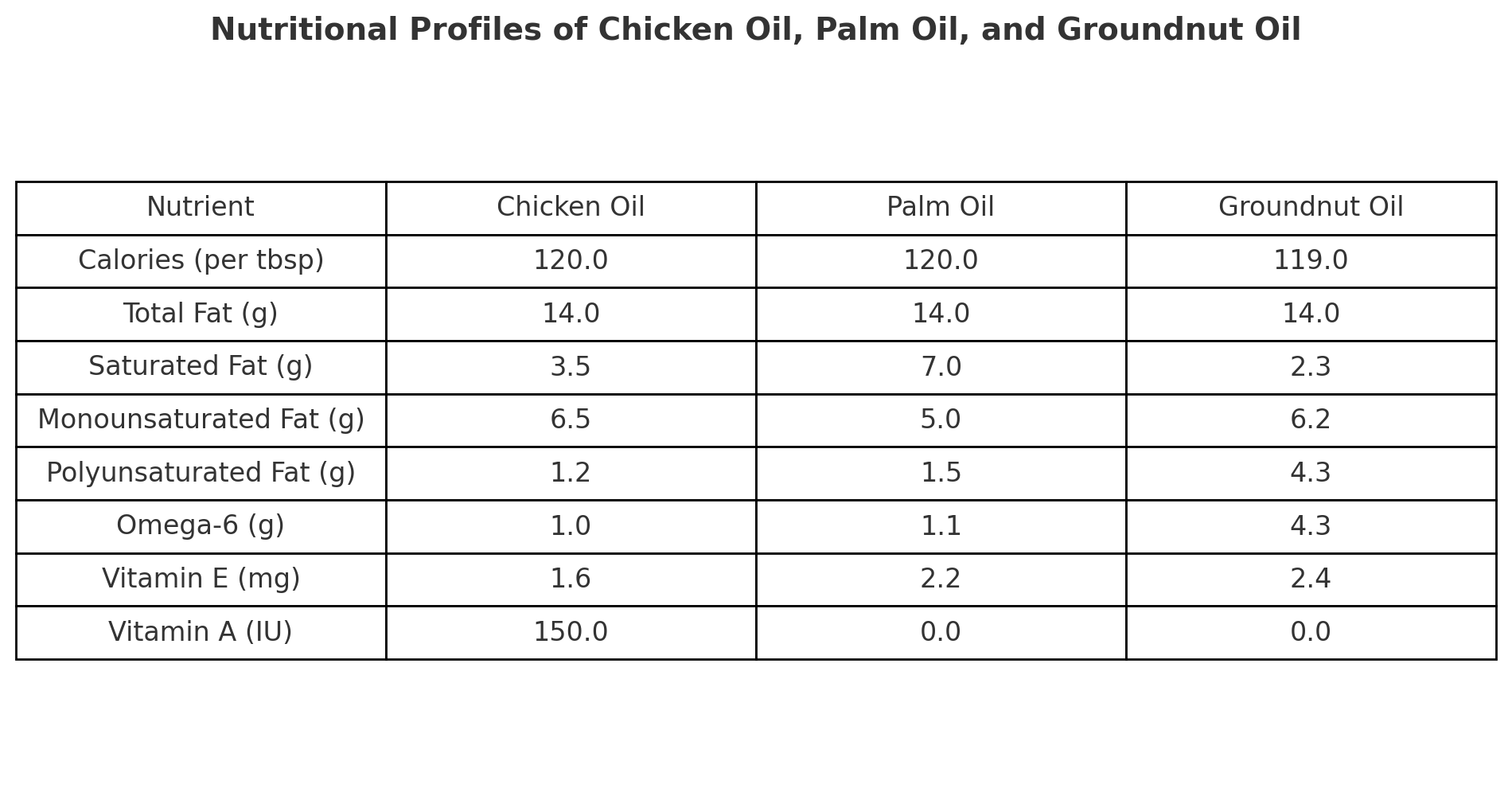All you need to know about Chicken Oil

Chicken oil is slowly beginning to gain recognition as a versatile and healthful cooking oil in Nigeria, although, in certain parts of the world (Particularly Asia), it has become a common condiment on kitchen shelves. But it’s rising in Nigeria beckons the need for an understanding of its production process, health benefits, and advantages over the common oil so one can make the informed dietary choice. This article delves into the intricate details of chicken oil, alongside its nutritional comparison with palm oil and groundnut oil, and why some have seen it as the healthier option.
How Chicken Oil is Made
1) Sourcing and Selection of Chicken Fat/Skin: Chicken oil is derived from carefully selected chicken fat and skin. The selection process is crucial as it is the first step to ensure the purity and nutritional value of the final product. Only the finest skins and fats from well-raised chickens are chosen for rendering.
2) Rendering Process: Rendering is the process of extracting oil from the chicken fat/skin. It is heated slowly, allowing the oil to separate from the skin/fat. This method preserves the nutritional integrity of the oil, ensuring it remains rich in essential fatty acids.
3) Purification and Filtration: After rendering, the oil undergoes purification and filtration to remove any impurities. This step guarantees a clean, clear oil that is safe for consumption and cooking.
Nutritional Profile of Chicken Oil
1) Essential fatty acids are vital fats that your body needs but can’t produce on its own, so you need to get them from your diet. Chicken oil is a rich source of these essential fats. They play several crucial roles in maintaining health: they help build and maintain cell membranes, support brain function, manage inflammation, reduce the risk of heart disease, and aid in hormone production. Essentially, these fats are important for keeping cells healthy, supporting cognitive functions, regulating inflammation, and contributing to overall well-being.
2) Vitamins and Minerals: Chicken oil contains vitamins such as vitamin A and vitamin E, which are antioxidants that protect cells from damage. It also provides essential minerals like selenium and zinc, contributing to immune health and metabolic functions.
3) Caloric Content: Like all oils, chicken oil is calorie-dense, providing a concentrated source of energy.
Health Benefits of Chicken Oil
1) Supports Heart Health: Chicken oil is rich in monounsaturated fats, which are known to support heart health by reducing bad cholesterol levels and increasing good cholesterol. This balance helps prevent cardiovascular diseases.
2) Promotes Healthy Skin and Hair: The vitamins and fatty acids in Chicken oil nourish the skin and hair, promoting a healthy, vibrant appearance. Regular consumption can lead to improved skin elasticity and stronger hair.
3) Anti-Inflammatory Properties: The omega-6 fatty acids in Chicken oil have anti-inflammatory properties, which can help reduce inflammation in the body and alleviate symptoms of inflammatory diseases.
4) Boosts Immune Function: Chicken oil is rich nutrient profile supports immune function, helping the body fend off infections and illnesses more effectively.
Nutritional Profile Comparison: Chicken Oil, Palm Oil, and Groundnut Oil
To make an informed choice about the cooking oils you use, it is essential to understand their nutritional profiles. The following comparison highlights the key nutritional aspects of chicken oil, palm oil, and groundnut oil

Culinary Uses of Chicken Oil
Chicken oil is excellent for frying due to its high smoke point and the chicken flavor it adds to dishes. It imparts a delicious, savory flavor to dishes, enhancing the overall taste.
– Using chicken oil in baking and roasting adds another unique depth of flavor. It keeps baked goods moist and succulent, while roasted vegetables and meats benefit from its rich taste.
– Chicken oil can be used in salad dressings and marinades, adding a unique twist to traditional recipes. Its rich flavor complements a variety of ingredients, making dishes more exciting.
Why Chicken Oil Should Be Used
1) Flavor Enhancement: Chicken oil enhances the flavor of food, making it more appetizing
2) Versatility in Cooking: Chicken oil’s versatility makes it suitable for a wide range of cooking methods, from frying to baking to dressing salads. It is a valuable addition to any kitchen.
3) Nutritional Advantages: Beyond its culinary uses, Chicken oil offers significant nutritional benefits, making it a healthier choice compared to many other cooking oils.
Myths About Chicken Oil That Aren’t True
There are several misconceptions surrounding chicken oil that deserve debunking. One prevalent myth is that Chicken Oil is inherently unhealthy due to its animal origin. Contrary to this belief, Chicken Oil is rich in monounsaturated fats, which are beneficial for heart health. It is often compared unfavorably to plant-based oils, but Chicken Oil contains essential nutrients like omega-6 fatty acids and vitamins A and E, which support overall well-being.
Another is that chicken oil is laden with trans fats (trans fats increase the risk of heart disease and other health problems) . In reality, chicken oil is free from trans fats, making it a healthier alternative to many commercially processed oils. Some people believe that chicken oil has a strong, off-putting flavor. However, when properly rendered and purified, it boasts a mild taste that enhances the natural flavors of dishes.
Why Parents Should Consider Chicken Oil for Their Families
As a parent, you’ve likely spent years carefully selecting the best foods and cooking oils for your family. Palm oil and Groundnut oil have been staples in your kitchen, providing a familiar taste and reliable performance. However, there’s a newcomer you should consider adding to your shelf: Chicken oil.
Unlike palm oil, which is high in saturated fats, chicken oil is rich in monounsaturated fats. These healthy fats are known to improve heart health by reducing bad cholesterol levels and increasing good cholesterol. In contrast, the high saturated fat content of palm oil can contribute to cardiovascular issues over time. By switching to chicken oil, you are making a heart-conscious decision that can benefit every member of your family.
Additionally, chicken oil is packed with essential fatty acids, including omega-6, which are crucial for brain development and function. As a parent, you want to provide your children with the best possible nutrition to support their growth and cognitive development. Groundnut oil also contains beneficial fats.
Flavor is another significant factor when considering a switch in cooking oils. You’ve likely grown accustomed to the distinct taste of groundnut oil and palm oil in your dishes. However, chicken oil has a mild, savory flavor that enhances rather than overpowers your food. It adds a subtle richness that can elevate everyday meals. Your family will appreciate the delicious taste, and you’ll enjoy the versatility chicken oil brings to your cooking.
When it comes to cooking performance, chicken oil stands out with its high smoke point. This makes it ideal for frying, baking, and roasting, ensuring that your food cooks evenly without burning. Palm oil and groundnut oil are also stable at high temperatures, but chicken oil provides the added benefit of imparting a unique flavor profile that can make your dishes more exciting.
Beyond its culinary and health benefits,
cost is a concern for families, but chicken oil offers great value for its benefits. While it may be slightly more expensive than palm oil, the health advantages and culinary versatility make it a worthwhile investment. The long-term benefits of improved heart health and better overall nutrition far outweigh the initial cost difference.
In conclusion, as a parent committed to the well-being of your family, testing chicken oil is a smart and health-conscious decision. It offers superior nutritional benefits, a mild and versatile flavor, and supports sustainable practices. By incorporating chicken oil into your cooking routine, you’re not only enhancing the flavor and healthfulness of your meals but also making a positive impact on the environment. Give chicken oil a try and experience the difference it can make for your family’s health and happiness.
How to Store Chicken Oil
1. Proper Storage Techniques: Store chicken oil in a cool, dark place to maintain its quality. Proper storage techniques ensure it remains fresh and safe for consumption.
2. Shelf Life and Expiry: Chicken oil has a long shelf life if stored correctly. Check the expiry date and use it within the recommended period to enjoy its full benefits.
Where to Buy Chicken Oil
Florieman Chicken Oil: Purchase chicken oil from Florieman Agro. We ensure quality and authenticity in every bottle. Our chicken oil costs N1300 per bottle. Orders can be made through this link: https://floriemanagro.com/chicken-oil/
Chicken oil is a nutritious and versatile cooking oil, offering numerous health benefits and culinary applications. Its lower saturated fat content, rich nutritional profile, and ethical sourcing make it a superior choice compared to other oils. Incorporate chicken oil into your cooking for a healthier, more flavorful experience.
